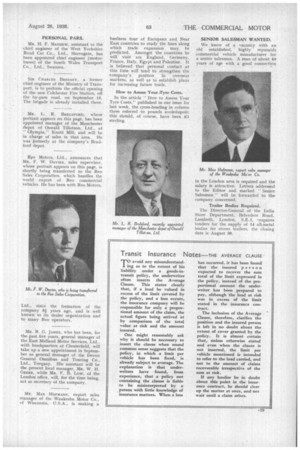Transit I nsurance Notes—THE AVERAGE CLAUSE' TO avoid any misunderstand' fag
Page 31

If you've noticed an error in this article please click here to report it so we can fix it.
as to the extent of his liability under a goods-intransit policy, the underwriter often inserts the Average Clause. This states clearly that, if a load be valued in excess of the limit covered by the policy, and a loss occurs, the insurance company will be responsible for only a propertional amount of the claim, the actual figure being arrived at by comparison of the total value at risk and the amount insured.
One might reasonably ask why it should be necessary to insert the clause when sound common sense suggests that the policy, in which a limit per vehicle has been fixed, is already subject to average. The explanation is that underwriters have found, from experience, that a policy not containing the clause is liable to be misinterpreted by a person with little knowledge of insurance matters. When a loss has occurred, it has been found that the insured per son expected to recover the sum total of the limit expressed in the policy, instead of the proportional amount the underwriter has been prepared to pay, although the load at risk was in excess of the limit stated in the insurance contract.
The inclusion of the Average Clause, therefore, clarifies the position and the insured person is left in no doubt about the extent of cover granted by the policy. It is almost certain that, Unless otherwise stated and even when the clause is not inserted, the limit per vehicle mentioned is intended to refer to the load carried, and not to the amount of claims recoverable irrespective of the sum at risk.
If any haulier be in doubt about this point in the insurance contract, he should clear up the matter at once, and not wait until a claim arises.




















































































